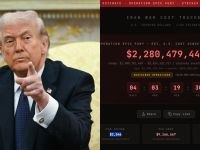Outgoing US Ambassador to Lebanon David Hale said Wednesday that a newly reinstituted trade program would help boost Lebanon’s economic growth by granting Lebanese exporters duty-free access to the US market. Late last month, President Barack Obama signed a law reactivating the Generalized System of Preferences, a trade program that was established in 1974 but halted in 2013.
The program aims to stimulate economic growth in Lebanon and 121 other designated countries by providing preferential, duty-free entry to the US for nearly 5,000 eligible products.
The newly signed law ensures that the GSP will remain in effect until 2017 and also makes the benefits of the program retroactive, meaning that Lebanese exporters can recover any import duties paid during the lapse since 2013.
Following talks on strengthening Lebanese-American economic ties, Hale and Economy Minister Alain Hakim held a joint news conference at the Economy and Trade Ministry Wednesday to explain the reauthorization of the GSP program.
“The GSP program allows select nations, including Lebanon, to export their products to America without paying duties and customs,” Hale said.
“For example, if a Lebanese exporter and a non-GSP exporter both send a case of olive oil to the United States, the Lebanese exporter will not pay duties, but the other firm will. This gives Lebanese products a competitive advantage in the American market,” he said.
“The result is simple: Lower duties increase exports, boosting economic growth.”
Hale said that almost all Lebanese exports to the US are GSP-eligible products that can be exported duty-free. In 2012, 96 percent of Lebanese exports to the US fell under this category and were granted entry into the US market duty-free, he said.
“Millions of dollars of Lebanese products — jewelry clothing, vegetables, nuts, olive oil, even hummus, you name it — will again enjoy an advantage over competitors in accessing the American market.”
The ambassador said the GSP demonstrates America’s commitment to supporting Lebanon and its economy, adding that Washington would continue to support programs and events that promote bilateral business relations.
“Many Lebanese are aware of the high level of security assistance that we are proud to provide to Lebanon’s Army and security services, but stability in Lebanon isn’t just about the military. America also seeks to help advance a healthy, stable society here through economic development.”
“Our activities in this regard may be less well-known than our military aid but they are every bit as important,” Hale said.
Hale also thanked Hakim for his efforts to build a strong economic relationship between Lebanon and the United States.
For his part, Hakim thanked Hale and the US administration for the GSP initiative and stressed its heightened importance during the current economic situation in Lebanon.
Lebanon has seen a sharp decline in exports as a result of the Syrian conflict, particularly after the closure earlier this year of the Nassib border crossing between Syria and Jordan. The crossing was the last remaining gateway for the land transport of Lebanese goods en route the Gulf market.
Hakim said the program would give Lebanon a unique advantage that could help it weather a tough ongoing economic situation.
The United States imported around $72.2 million worth of Lebanese goods in 2014, according to the US Census Bureau.
By Maryam Hoballah








